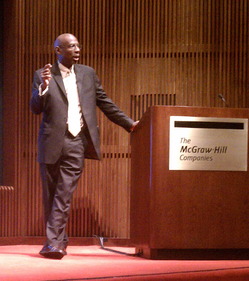
I'm becoming a part of the movement to save education. I went to see "Waiting for Superman" two days after it opened. I go to educational webinars. I was invited to hear Geoffrey Canada (pictured) speak at a McGraw-Hill function last week, and I used my phone to take this picture and so you can see I was really there. What has become increasingly clear is that in spite of all the clamor about literacy and whether or not kids can read, there is no mention about the quality of WHAT kids are reading. In an online #edchat (# refers to a group on Twitter) last week, teachers were slamming textbooks right and left. Did you know each textbook costs $80+? That's not only a strain on school budgets; it's also a strain on kids' backs! So teachers were talking about putting together their own reading materials for their classes from free open source materials, both print and digital. The underlying premise: one source of information is interchangeable with another. I tweeted (peeped? piped up?) "I left teaching to write. No time to do both well." Don't think anyone heard me. I was not retweeted.
There is a consensus about what makes a great teacher -- it takes mentoring, experience, constant professional development, passion, commitment, discipline, sacrifice and TIME. Guess what, folks -- it takes the same thing to become a great writer. Our editors are our mentors, we write, write, write, we get feedback from our readers and critics. It's tough but we stay with it despite no union, no safety net, no regular paycheck. (And, let me tell you, there is attrition in the ranks.) The qualities that make a great teacher are evident in their personalities, in their intense interactions with their students, in their deeds. What reaches their students is WHO they are as human beings -- their humanity. Guess what folks -- the same thing is true of us writers. We all have learned how to put who we are as human beings behind the words on the page. It's called "voice." Literature has voice. Can you feel how hard I'm hitting these keys right now? I want you to HEAR me. I want my words to shout, not tweet.
The #edchat I participated in was my first. I was a little handicapped by my lack of experience with Twitter. Tweets flew by so fast I was breathless trying to read and type (and think) simultaneously. (So many tweets, so little time...) I was amazed at the way some tweets got answered directly by others. (How'd they do that?) And that there were so few typos!!! Finally I wrote a tweet that seemed to resonate with the group: "Where is it written that every kid has to read the same book on a subject? Why can't they read different books and discuss?" I used up all my 140 characters on that one, but it got me noticed. That tweet was retweeted by quite a few, and afterwards a lot of people tweeted me directly (it's like an e-mail, but very short) to thank me and invite me back next week. (I took a tutorial on TweetDeck to be better prepared.)
When I first posted this question on my other group blog, Interesting Nonfiction for Kids, I stated that the people who read this blog all get what we are saying: that we're preaching to the choir. It feels good to have that validation. But it's becoming increasingly clear to me that our task is to reach the people who aren't listening to us -- mainly educators. I don't think that they know or have even thought about the difference nonfiction literature can make in their jobs and in their students' lives. I got an interesting response from a teacher, who said:
"That may be true, but I have a slightly different take on it being a teacher. I think we get it. But the rush to push standardized test scores higher and higher has cornered us. Higher-ups in administration have been sold the idea that basal readers are the only way to make sure test scores are good. We've been commanded to eliminate all those fabulous interdisciplinary units where great nonfiction was the staple ... and elementary teachers are scripted in what strategies they are to teach. No longer is a district interested in building readers ... they have to have test scores."
My mission is to put the joy of learning back into the classroom. Forgive me if I appear to be a Johnny-One-Note. Administrators take note. Want to see the difference between the traditional expository writing you're feeding kids and literature on the same subject matter? I've asked my brilliant colleagues at INK to send me two paragraphs on the same subject: one written strictly for information and one written by them. I've posted them on our new wiki. On the left you'll see a hyperlinked page listed with the title "What's the difference between literature and traditional informational writing? See for yourself." At the top of this page you'll see a tab for "Discussion." Click on that and hit "New Post" to register a comment about the page that can become a conversation. It takes many voices to make a difference, and a chorus to be heard.
If you've seen the light, learn how to use Twitter and tweet the h... out of this blog!!



The comparison texts on your wiki are very telling. I enjoyed them so! I will forward this to my literacy-education colleagues. However, you are right about who is listening. My literacy-education colleagues are the choir to which you preach. We teach the teachers, but if principles and superintendents insist on something other than the methods and pedagogical tools we profess to know work, then we need to start talking to the Ed Leadership folks at universities too. They're the ones graduating the future principals.